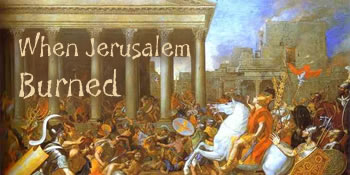
At the beginning of the Common Era, a new group arose among the Jews: the Zealots (in Hebrew, Ka-na-im). These anti-Roman rebels were active for more than six decades, and later instigated the Great Revolt. Their most basic belief was that all means were justified to attain political and religious liberty.
The Jews' anti-Roman feelings were seriously exacerbated during the reign of the half-crazed emperor Caligula who, in the year 39, declared himself to be a deity and ordered his statue to be set up at every temple in the Roman Empire. The Jews, alone in the empire, refused the command; they would not defile God's Temple with a statue of pagan Rome's newest deity.
Caligula threatened to destroy the Temple, so a delegation of Jews was sent to pacify him. To no avail. Caligula raged at them, "So you are the enemies of the gods, the only people who refuse to recognize my divinity." Only the emperor's sudden, and violent death saved the Jews from wholesale massacre.
Caligula's action radicalized even the more moderate Jews. What assurance did they have, after all, that another Roman ruler would not arise and try to defile the Temple or destroy Judaism altogether? In addition, Caligula's sudden demise might have been interpreted as confirming the Zealots' belief that God would fight alongside the Jews if only they would have the courage to confront Rome.
In the decades after Caligula's death, Jews found their religion subject to periodic gross indignities, Roman soldiers exposing themselves in the Temple on one occasion and burning a Torah scroll on another.
Ultimately, the combination of financial exploitation, Rome's unbridled contempt for Judaism, and the unabashed favoritism that the Romans extended to gentiles living in Israel brought about the revolt.
In the year 66, Florus, the last Roman procurator, stole vast quantities of silver from the Temple. The outraged Jewish masses rioted and wiped out the small Roman garrison stationed in Jerusalem. Cestius Gallus, the Roman ruler in neighboring Syria, sent in a larger force of soldiers. But the Jewish insurgents routed them as well.
This was a heartening victory that had a terrible consequence: Many Jews suddenly became convinced that they could defeat Rome, and the Zealots' ranks grew geometrically. Never again, however, did the Jews achieve so decisive a victory.
When the Romans returned, they had 60,000 heavily armed and highly professional troops. They launched their first attack against the Jewish state's most radicalized area, the Galilee in the north. The Romans vanquished the Galilee, and an estimated 100,000 Jews were killed or sold into slavery.
Throughout the Roman conquest of this territory, the Jewish leadership in Jerusalem did almost nothing to help their beleaguered brothers. They apparently had concluded - too late, unfortunately - that the revolt could not be won, and wanted to hold down Jewish deaths as much as possible.
The highly embittered refugees who succeeded in escaping the Galilean massacres fled to the last major Jewish stronghold - Jerusalem.
The scene was now set for the revolt's final catastrophe. Outside Jerusalem, Roman troops prepared to besiege the city; inside the city, the Jews were engaged in a suicidal civil war. In later generations, the rabbis hyperbolically declared that the revolt's failure and the Temple's destruction were due not to Roman military superiority but to causeless hatred (sinat khinam) among the Jews (Talmud, Yoma 9b). Though the Romans would have won the war in any case, the Jewish civil war both hastened their victory and immensely increased the casualties. One horrendous example: In expectation of a Roman siege, Jerusalem's Jews had stockpiled a supply of dry food that could have fed the city for many years. But one of the warring Zealot factions burned the entire supply, apparently hoping that destroying this "security blanket" would compel everyone to participate in the revolt. The starvation resulting from this mad act caused suffering as great as any the Romans inflicted.
We do know that some great figures of ancient Israel opposed the revolt, most notably Rabbi Yochanan ben Zakkai. Since the Zealot leaders ordered the execution of anyone advocating surrender to Rome, Rabbi Yochanan arranged for his disciples to smuggle him out of Jerusalem, disguised as a corpse. Once safe, he met the Roman general Vespasian, who granted him concessions that allowed Jewish communal life to continue.
During the summer of 70, the Romans breached the walls of Jerusalem and initiated an orgy of violence and destruction. Shortly thereafter, they destroyed the Second Temple. This was the final and most devastating Roman blow against Judea.
It is estimated that as many as one million Jews died in the Great Revolt against Rome. When people today speak of the almost two-thousand-year span of Jewish homelessness and exile, they are dating it from the failure of the revolt and the destruction of the Temple. Indeed, the Great Revolt of 66-70, and the Bar-Kokhba revolt some sixty years later, were the greatest calamities in Jewish history prior to the Holocaust. In addition to more that one million Jews killed, these failed rebellions led to the total loss of Jewish political authority in Israel until 1948. This loss in itself exacerbated the magnitude of later Jewish catastrophes, since it precluded Israel from being used as a refuge for the large numbers of Jews fleeing persecutions elsewhere.
The above is from the book Jewish Literacy by Rabbi Joseph Telushkin.
Joseph Telushkin is the author of several books, including The Book of Jewish Values: A Day By Day Guide to Ethical Living.

